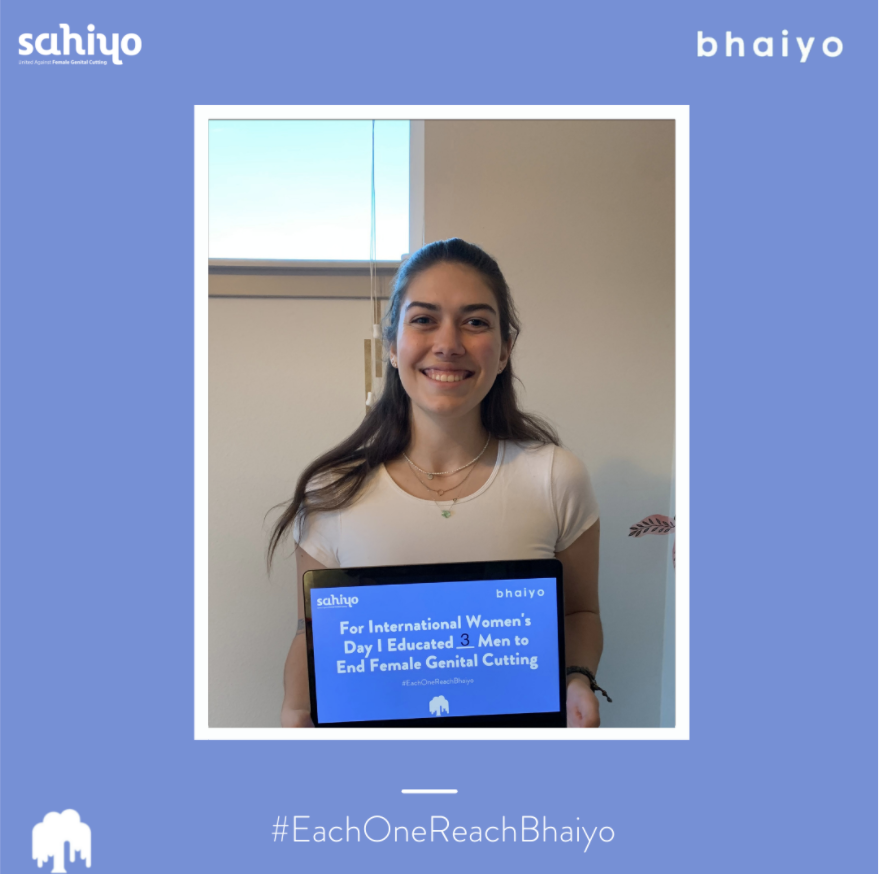How I took part in the Each One, Reach Bhaiyo Campaign: Turning my Dad into a Bhaiyo

By Meg Sinnott In honor of International Women’s Day on March 8th, Sahiyo launched our campaign “Each One, Reach Bhaiyo.” During this campaign, Sahiyo encouraged community members to reach out to and educate at least one male-identifying person in their life about female genital cutting (FGC). Through this campaign we involved men in the important work of protecting women and girls. We know that just one conversation can spark a global change towards preventing the human rights violation that is FGC amongst future generations. Learn more here. Why did you want to reach out to a man in your life to discuss FGM/C? I decided to reach out to a man in my life because I believe that advocacy for FGM/C and other gender-based violence must include men. In order to change cultural and traditional practices, the whole community has to be involved. Additionally, the systems that have supported FGM/C are patriarchal and stem from the control of women’s bodies and sexuality. If men uphold those systems and beliefs they are complicit in allowing the practice to continue. I spoke to my dad specifically because while he is a highly educated and intelligent man, he has been somewhat blind to women’s struggles when I have brought them up with him in the past. What was his reaction? He was very supportive of Sahiyo’s mission upon learning more about the scope of modern-day FGM/C in the Bohra community. As a white atheist, he had some trouble understanding at first why mothers would continue to subject their daughters to FGM/C if they themselves disagreed with it because he has never followed a religious practice. However, after a discussion on the impact of social norms on the actions of individuals, he came to see that FGM/C is a multifaceted issue. Was he aware of FGM/C? While he was aware of FGM/C he did not know the different types, nor did he know that it was commonly practiced in communities outside of Africa. Additionally, he was not aware of the reasons that FGM/C was being practiced, nor that it was most commonly done by older women and not medical professionals. What advice would you give to others trying to reach out to the men in their lives? I would tell others reaching out to men in their lives that they should not be worried about a negative reaction. Any conversation is important to spreading awareness and bringing an end to FGM/C!
डियर मासी: खतना के खिलाफ बोलने से क्या निजी ज़िन्दगी पे असर हो सकता है?

डियर मासी एक ऐसा कॉलम है, जिसमें सेक्स और रिश्तों के बारे में वह सब कुछ बताया गया है जो आप जानना तो चाहते हैं, लेकिन पूछने से डरते हैं! यह सहियो और वी स्पीक आउट इन दो संगठनों ने मिलकर बनाया है। यह कॉलम उन लोगों के लिए है जिन्हें महिला जननांग काटने या खतना के बारे में सवाल है। यह कॉलम ख़तना कैसे हमारे शरीर, दिल, दिमाग, लैंगिकता और रिश्तों पर असर करता है इसके बारे में भी बात करता हैं। बोहरा समाज के सन्दर्भ में, माँ की बहन मासी हैं। आपके सवालों का हम स्वागत करते हैं। अपने सवाल बेझिझक यहाँ पर भेजिए। अपनी पेहचान गुप्त भी रख सक्ते हैं| प्यारी मासी, अगर आप महिला जननांग विकृति (एफ.जी.एम./सी.) पर बोलने वाली एक जानीमानी हस्ती है तब इतने गहरे व्यक्तिगत मुद्दे से जुड़ी हुई आपकी पहचान के साथ आप कैसे प्रबंधित करते हैं? यह खास कर ऑनलाइन डेटिंग की दुनिया में मुश्किल है। — गुमनाम प्यारी गुमनाम, यह एक बहुत ही बढ़िया सवाल है। जो सरवाईवर्स अवामी दायरे में “बाहर” आए हैं उन्हें इन हालात से जूझना पड़ा है। अवामी दायरे में आकर खुलकर बात करना या नहीं करना यह हरेक का निजी फैसला होता है। सभी को उनके लिए जो फ़ैसला थीक लगे वही करना चाहीए| हम एफ.जी.एम./सी. सरवाईवर्स के बारे में लोग बहुत सी बातें मान कर चलते हैं, है ना? यह इतना बदनाम मसला है कि लोग यह नहीं समझते कि हम एक जैसे नहीं हैं। हमारी याददाश्त अलग हैं। हमारे लक्षण अलग-अलग हैं। हमारे यौन कार्य अलग-अलग हैं। हमारे घरवालों और बिरादरियों के साथ हमारी अलग-अलग मजहबी मान्यताएं और संबंध हैं। दूसरे शब्दों में, आप किसी एफ.जी.एम./सी. सरवाईवर के बारे में कुछ भी मान कर नहीं चल सकते। और फिर भी लोग ऐसा करते हैं। ये धारणाएं शर्मिंदगी पैदा करती हैं और पूरी तरह से गलत हो सकती हैं। असली सदमे के वक्त हम में से बहुत सी लड़कियों को बताया गया कि, “यह कुछ भी नहीं है; रोना मत,” और “यह एक राज है; किसी को बताना मत।” इसलिए, एफ.जी.एम./सी. कैसे नुकसानदेह है, इस बारे में आवामी तौर पर बात करना गलत या शर्मनाक महसूस हो सकता है। तब हम बच्चे थे और हम शायद यह नहीं समझ सके कि हमारे जिस्म के साथ क्या हो रहा है। किसी सदमे से मुकाबला करने के लिए बच्चे भरोसेमंद बड़े-बूढों के बजाय खुद को कसूरवार ठहराते हैं। यह हमारा कसूर है, यह सोच शर्मिंदगी पैदा करती है। तो यहीं कहना है कि एफ.जी.एम./सी. हमें बहुत शर्मसार कर सकता है। इस पर थोड़ी देर बाद बात करेंगे। मैं 2015 से एक कार्यकर्ता हूँ, लेकिन मैं खुलकर सबके सामने आने को लेकर बहुत डरी हुई थी। अपने सरवाईवर अनुभवों पर खुलकर चर्चा कर सकने वाली अपनी कार्यकर्ता बहनों की तारीफ और हसरत करती थी। जबकि वे सबसे बेहतरीन रोल मॉडल और मददगार थे, मैं उनके मिसालों पर अमल नहीं कर सकी। जब भी मैंने ऐसी कोशिश की, तो मैं खुद से जुदा, थकी हुई और बीमार महसूस करती। मैं समझ गयी कि मेरा जिस्म मुझे एक बड़ा “नहीं” का इशारा दे रहा है। मैं तैयार नहीं थी। समस्या यह थी कि मैं अपने बिरादरी में एफ.जी.एम./सी. के बारे में एक उपन्यास ख़त्म कर रही थी और मैं जानती थी कि मुझसे साहित्य-फेस्टिवल्स और मीडिया इंटरव्यू में उपन्यास के मुद्दों से मेरे व्यक्तिगत संबंध के बारे में पूछा जाएगा। मैंने डर तो महसूस किया, लेकिन उसके बावजूद, मुझे पता था कि मुझे अपनी परेशानियों से गुजरना है और तैयार होना है। लेकिन यह कोई आसान प्रक्रिया नहीं थी। मैंने वापस थेरेपी शुरू किया। मैंने मॉक इंटरव्यू किए जहाँ दोस्त-सहेलियों ने सबसे ज्यादा दखलअंदाजी करने वाले सवाल पूछे और मुझे अपनी हदें तय करनी थीं और जवाब कैसे देना है इस बात का फैसला करना था। सरवाईवर होने का मतलब क्या है इसके लिए मुझे अपने खुद के विश्वासों और रूढ़ियों को चुनौती देनी पड़ी। मैंने ‘सेवेन थिंग्स नॉट टू आस्क ए ख़तना सर्वाइवर’, खुद के लिए और अपने दोस्तों और पाठकों – दोनों के लिए लिखा। फिर भी मैं नर्वस थी। और फिर मेरे किताबी सफ़र की शुरुआत में कुछ अनपेक्षित हुआ। मुझे डर नहीं लगा। मेरा जिस्म अवामी तौर पर खुलकर बोलने के लिए हाँ कहने लगा। मैंने अपने रास्ते में आने वाले सवालों को अवसरों के रूप में देखा, दखलंदाजी के रूप में नहीं। मैंने तीन महीने पहले इसके बारे में बात करना शुरू किया था, तब से मैंने बात करना छोड़ा नहीं हैं। और मैं ठीक हूँ। सबसे अच्छी बात यह है कि मैंने शर्मिंदगी से आज़ाद महसूस किया है। मैं यह कहना चाहती हूँ कि लोग मेरे बारे में कल्पनाएँ करते रहेंगे। और शायद जिंदगी भर के लिए खतना/एफ.जी.एम./सी. को मेरी पहचान के साथ जोड़ेंगे। लेकिन मुझे इसके बारे में कोई शर्म नहीं है, इसलिए मुझे अब परवाह भी नहीं है। मुझे लगता है कि हमारे किसी भी हाशिए की पहचान या अनुभव के साथ भी कुछ ऐसा ही होता है। जब हम किसी खास नस्ल वाले या औरत या मुस्लिम या मोटा या गरीब या विकलांग या भिन्न लैगिकता वाले या उम्र दराज या डिप्रेस या हमेशा बीमार रहने की अपनी आंतरिक शर्म को लेकर आगे आते है और उससे दो-चार होते हैं, तो हम खुद को आजाद कर देते हैं। शर्मिंदगी से आजादी की ओर बढ़ने के रास्ते हम में से हरेक के लिए अलग-अलग नजर आएँगे। इस ओर आगे बढ़ने का पहला कदम होगा कि आप जो शर्मिंदगी महसूस करते हैं, उसे मान लेना। आप खुद से यहाँ निचे दिए गए कुछ सवाल पूछिए (और ऐसा करते समय, अपने जस्बातों और अपने जिस्म के प्रतिभाव पर ध्यान दें): -एफ.जी.एम./सी. सरवाईवर्स के बारे में कौन से मिथक या धारणाएँ मौजूद हैं? उनकी लिस्ट बनाएँ। मैं, थोड़ा-सा भी क्यों न हो, कौनसे धारणाओं पर यकीन करती हूँ? -क्या मेरे गुप्तांगों को काटना शर्मनाक है? क्या मेरे गुप्तांग शर्मनाक हैं? किन मायनों में? -अगर कोई पड़ोसी या साथीदार या अजनबी जानते है कि मैं सरवाईवर हूँ तो मुझे कैसा महसूस होता है? अब हम ऑनलाइन डेटिंग पर आते है। किसी संभवित डेट के बारे में मालूमात करने के लिए उन्हें गुगल सर्च
Sahiyo India holds guest lecture for students in Mumbai

On March 5th, in the run up to International Women’s Day, Sahiyo India was invited to hold a guest lecture on female fenital cutting (FGC) for first-year students of Mumbai’s BMN Women’s College of Home Science; this screening was held in association with Muse Foundation. Sahiyo co-founder Aarefa Johari conducted the online session, which had over 50 student attendees. The session began with the screening of two short films from Sahiyo and StoryCentre’s Voices to End FGM/C series: Why by Fakhera, and A Chorus of Voices by Aarefa. The lecture then helped students understand what FGC is, why it is practiced, how it is harmful, and what can be done to end the practice. Aarefa also explored the concept of social norms and why they persist. Students were then invited to talk about the harmful social norms prevalent in their own cultures and homes, including menstrual taboos, which nearly every young woman in the class had experienced. This was the second time that Sahiyo India has given a guest lecture on FGC at the BMN College.
